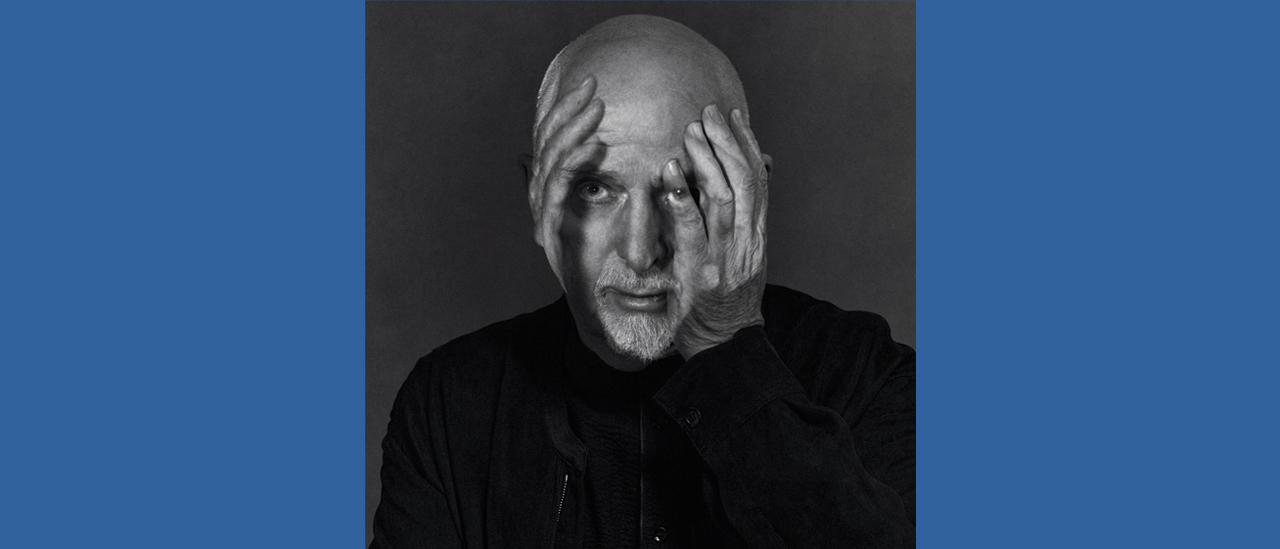
The last time Peter Gabriel released a whole album of original material was in 2002. Tony Blair was prime minister, Wikipedia was just getting started, and the Twin Towers in New York had barely been down a year. Given the passage of time, one has to wonder about the voice, which tends to weaken and lose precision when a singer crosses the threshold into senior citizenship.
Thankfully there are no such worries with i/o, Peter Gabriel’s 10th solo studio album, with his soulful larynx projecting even more gracefully than he did on Where The Sour Turns To Sweet, the opening track of Genesis’ 1969 debut album From Genesis To Revelation. Moreover, he has the same range he drew upon for Supper’s Ready – the surrealist prog opera from his old band’s fourth album Foxtrot – still at his disposal. Genesis themselves closed for business last year, so to hear Gabriel soaring undiminished feels like something of a miracle.
And there’s more good news. He can still write songs that turn the head and stir the heart, even if it takes him a little longer these days. Playing For Time, a ballad about mortality that begins with a motif from Chopin’s Marche Funèbre and takes in the hymnal shapes of an old spiritual, feels like a song for the ages. It has the gravity of a Blood Of Eden or even a Don’t Give Up, though where those songs were performed with Sinéad O’Connor and Kate Bush, respectively, here it’s Gabriel on his own.
Most of the songs on i/o have already been released, drip-fed throughout the year to coincide with the lunar cycle. Accompanying each track has been specifically commissioned art, created by some of the world’s most renowned artists, including Ai Weiwei, Olafur Eliasson and Cornelia Parker.
The first of these singles was Panopticon, here taking its place as the album’s opening track. As the portmanteau title suggest, it references both philosopher Jeremy Bentham’s cylindrical prison, the panopticon, and the digital moguls who harvest our data and spy on us. It’s a barnstormer in the Gabriel songbook: cogent, catchy and thought-provoking, and also a signifier of i/o’s big themes.
And so it proves: there are songs about terrorism (Live And Let Live), injustice (The Court), locked-in syndrome (Road To Joy) and interconnectivity (i/o itself), all released as singles over the past 12 months. Despite their dark themes, these songs are really about uplift in difficult times, and in each case we’re in the safest of waters musically. Gabriel did apparently attempt to collaborate with EDM luminary Skrillex, a journey outside of his comfort zone that perhaps mercifully remains unreleased. Instead, we get the heartwarming This Is Home, about domesticity and composed in reaction to Skrillex’s suggestion to write a banging tune about partying all night. Punishing beats are eschewed for a Swedish male voice choir and the orchestral arrangements of John Metcalfe.
So far, so solid, though with Gabriel there always has to be some kind of innovation. In this case, i/o offers different mixes for each track by two of the world’s most celebrated engineers: Mark ‘Spike’ Stent (Madonna, U2, Ed Sheeran) who Gabriel describes as a “painter”, providing the Bright-Side mixes; and Tchad Blake (Elvis Costello, U2, Sheryl Crow), “a sculptor”, brings the Dark-Side mixes. They’re available to buy separately on vinyl, while the CD version includes both plus a Dolby Atmos mix by Hans-Martin Buff with the In-Side mix for anyone whose living room boasts an overabundance of hi-tech speakers.
In truth, what could have been an interesting exercise in exploring the minutiae of mixing actually falls down given how similar the results are between Spike’s
version and Blake’s version. Clearly both have done sound professional jobs that make the best of the rich resources available, making ‘bright’ and ‘dark’ essentially misnomers, given that neither feel particularly bright or dark. The release of both versions of Olive Tree in August was supposed to highlight the variables but merely confirmed that most people are more interested in the song than the production. Only audiophiles with especially attentive ears are likely to pick out discernible differences, with the contrasts all but negligible to the rest of us. Still, given the elephantine gestation period of this album, we’ll take it in whichever format we can get it.
Gabriel recently joked that fans receiving a song each full moon was like them “getting a Lego piece each month”. By that measure, i/o is a veritable sonic Legoland, albeit one for grown-ups, given the weighty themes. The world has changed since 2002, mostly for the worst, but it’s a better place with i/o in it.







